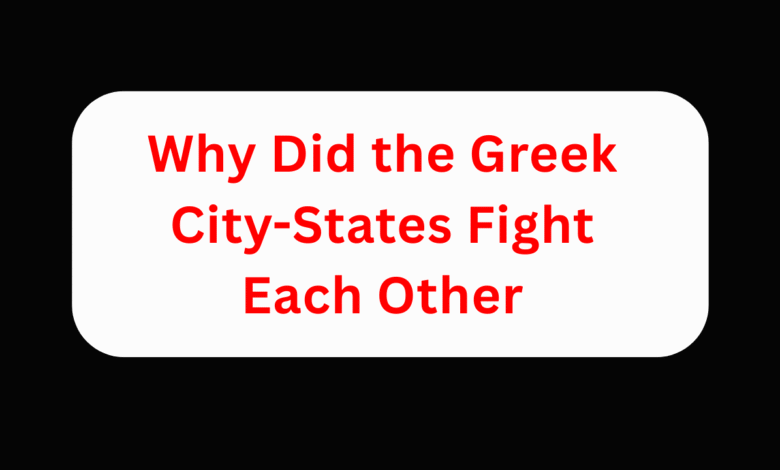Why Did the Greek City-States Fight Each Other

Ancient Greece is remembered for philosophy, democracy, art, and science. It gave the world thinkers like Socrates, Plato, and Aristotle. It created the Olympic Games and amazing architecture like the Parthenon. But along with these achievements, Ancient Greece was also full of conflicts. Instead of being one united country, it was divided into small city-states, also called poleis.
The most famous city-states were Athens, Sparta, Corinth, Thebes, and Delphi. Each city-state had its own government, army, culture, and way of life. While they shared a common language and religion, they often fought each other. These fights sometimes lasted for years and caused great destruction. But why did they fight so much In this article, we will explore the main reasons behind these conflicts in very simple words.
Independent Nature of City-States
The first reason was independence. Every Greek city-state wanted to rule itself without being controlled by others. Athens loved democracy and freedom. Sparta was strict and military focused. Corinth was wealthy from trade.
Because of these differences, each city-state felt proud of its own system and did not want to be united under one ruler. This independence created competition and led to wars.
Geography of Greece
The geography of Greece also played a role. Greece is full of mountains and separated by seas. These natural barriers made it difficult for one central government to control all areas.
Instead, small communities developed in valleys and islands. Each became a city-state with its own identity. Since travel and communication were not easy, these city-states grew separately and often clashed with neighbors.
Competition for Power
Just like modern countries compete for power, Greek city-states also competed. Athens wanted to expand its influence through trade and culture. Sparta wanted to dominate with military strength.
This competition often turned into war. Both Athens and Sparta wanted to be leaders of Greece, and their rivalry was one of the main causes of constant fighting.
Different Governments and Values
Athens believed in democracy where citizens had a voice. Sparta believed in oligarchy where a few leaders controlled the state with strict discipline. These different systems created clashes.
Athens valued art, learning, and trade. Sparta valued war, strength, and obedience. These opposite values made it hard for them to cooperate.
Wealth and Trade Rivalries
Some city-states were rich because of trade and location. Corinth, for example, was a powerful trade center. Athens controlled the sea with its navy. Rival city-states often fought to control important trade routes and resources.
Wealth was a reason for jealousy and wars. The more powerful a city-state became, the more others wanted to stop it.
Alliances and Leagues
City-states often formed alliances for protection. Athens created the Delian League, a group of city-states united under Athenian leadership. Sparta led the Peloponnesian League.
At first, these leagues were for defense against outside enemies like Persia. But later, they turned into power struggles. Athens used the Delian League to control others, which made many city-states angry. This rivalry between leagues led to major wars.
The Peloponnesian War
The most famous example of Greek city-states fighting each other is the Peloponnesian War (431–404 BCE). Athens and Sparta fought for almost 30 years. Many other city-states were also dragged into the war.
The war destroyed much of Greece, weakened the economy, and killed thousands. In the end, Sparta won, but Greece as a whole became weaker, making it easier for outsiders like Macedonia to conquer later.
Pride and Honor
Greek city-states valued pride and honor very highly. Even small insults could lead to war. For example, if one city-state disrespected another in trade or politics, it could spark a conflict.
This culture of honor meant that compromise was rare. Fighting was seen as a way to protect dignity.
Influence of Outside Enemies
Sometimes outside enemies like Persia attacked Greece. At first, the city-states united against Persia, as in the Persian Wars. But once the threat was over, they turned back to fighting each other for leadership of Greece.
Instead of staying united, victory over Persia made Athens stronger, which scared Sparta. This again led to rivalry.
Weakness of Unity
Unlike empires like Egypt or Rome, Greece never became a single strong empire during its classical period. Its lack of unity made it powerful in culture but weak in politics.
City-states could not think of themselves as one family. They thought of themselves as rivals. This weakness of unity explains why they fought again and again.
Lessons from Greek Conflicts
The history of Greek city-states teaches us that division weakens even the most advanced societies. Greece gave the world democracy, art, and science, but its constant fighting stopped it from becoming a stable empire.
Later, this weakness allowed Philip of Macedonia and his son Alexander the Great to conquer all of Greece. If the city-states had stayed united, history might have been very different.
Greek city-states fought each other for many reasons. Geography separated them into independent communities. Pride in their own governments and cultures made them resist unity. Competition for wealth, power, and trade routes increased rivalry. Alliances like the Delian League and Peloponnesian League turned into battles for dominance.
The Peloponnesian War showed how destructive these conflicts could be. In the end, constant fighting weakened Greece and opened the door for outsiders to take control.
The story of Greek city-states reminds us that unity creates strength, but division creates downfall. Their cultural achievements remain a treasure for the world, but their political fighting is a warning for all time.




